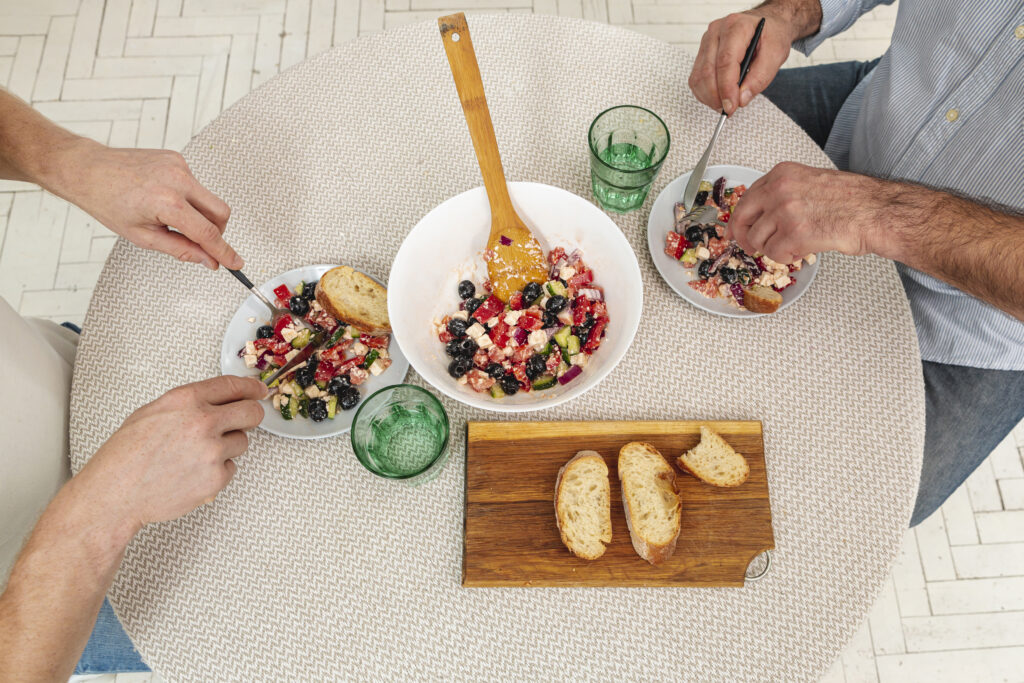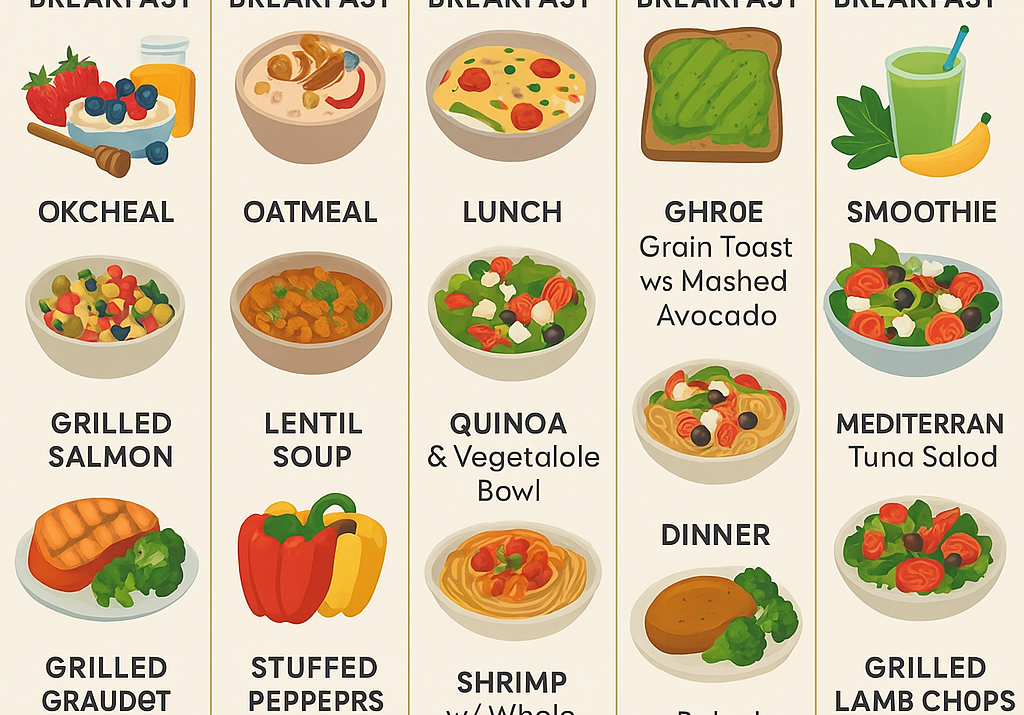The Mediterranean diet is one of the top ranked healthiest diets in the world. It’s a heart-healthy lifestyle inspired by the culture and traditional eating habits of coastal countries bordering the Mediterranean Sea, like Greece, Italy, and Spain. It’s about savoring simple, wholesome meals made with fresh vegetables, fruits, nuts, whole grains, olive oil, and lean proteins like fish and legumes. It’s rooted in connection, balance, and vitality. It’s heart-smart, brain-boosting, and deliciously sustainable—making it one of the most-loved and most-studied diets in the world.

Here’s what makes the Mediterranean diet a superstar:
Scientifically Proven Health Benefits
- Reduces the risk of heart disease & stroke
- Helps manage type 2 diabetes
- Improves brain function & slows cognitive decline
- Supports healthy weight loss
- Lowers inflammation
- Promotes gut health
Sustainable and Easy to Follow
- No calorie counting or extreme rules
- Tastes amazing—think juicy tomatoes, creamy hummus, grilled fish, crusty bread
- Flexible for different preferences (vegetarian, gluten-free, etc.)
Here’s a simple way to ease into Mediterranean Diet:

1. Begin Mediterranean Diet with Small Swaps
Start by replacing what you’re already eating with healthier, Mediterranean-inspired options:
- Butter ➝ Olive Oil
- White bread ➝ Whole grain bread or sourdough
- Fried snacks ➝ Nuts or roasted chickpeas
- Red meat ➝ Grilled fish or legumes
2. Make Vegetables the Star of Your Plate
- Aim for half your plate to be vegetables at lunch and dinner.
- Go for variety and color—leafy greens, tomatoes, eggplant, zucchini, bell peppers, etc.
3. Use Olive Oil Generously
- It’s your main fat source—use it for cooking, dressing salads, and even drizzling on toast.
4. Eat Fish or Seafood Twice a Week
- Grilled salmon, sardines, tuna, or shrimp are great.
- Try fish tacos, seafood pasta, or a tuna salad with beans and veggies.
5. Snack Smart
- Choose nuts, seeds, fresh fruit, or Greek yogurt with a drizzle of honey.
- Hummus with veggies or olives with a piece of cheese also make great snacks.
6. Include Whole Grains
- Replace white rice with brown rice, quinoa, farro, or bulgur.
- Enjoy whole grain pasta with tomato-based sauces or roasted veggies.
7. Go Light on Red Meat & Sugar
- Reserve red meat for once a week or special occasions.
- Choose fruit or dark chocolate (in moderation) instead of sweets or pastries.
8. Make Meals a Ritual
- Eat slowly, preferably with others. Enjoy meals as a social and joyful experience.
- Avoid distractions like phones or TV while eating.
9. Hydrate the Mediterranean Way
- Drink plenty of water.
- Enjoy herbal teas, and if you drink alcohol, limit it to a glass of red wine with meals (optional).
10. Get Moving
- Incorporate daily walks, gardening, or light yoga—movement is part of the lifestyle!
Additional Tips That Go With It
- Cook at home more often—it’s part of the experience.
- Eat with family or friends—the social aspect is key.
- Move naturally—walk, dance, garden—whatever you enjoy!
- Savor your meals slowly—no rushed eating in front of screens.
Guide: Sample Days on the Mediterranean Diet

🌞 Day 1
Breakfast
– Oatmeal cooked with almond milk, topped with chopped figs and a drizzle of honey
– Green tea
Lunch
– Lentil soup with carrots, celery, and herbs
– Side of whole grain pita and hummus
– Mixed greens with olive oil + lemon juice
Snack
– A handful of pistachios or roasted chickpeas
Dinner
– Baked cod with olives, tomatoes, garlic, and herbs
– Farro salad with arugula and cucumber
– Steamed broccoli with lemon
🌞 Day 2
Breakfast
– Avocado toast on whole grain bread
– Boiled egg
– Herbal tea
Lunch
– Mediterranean chickpea salad (chickpeas, red pepper, cucumber, onion, parsley, olive oil)
– Small slice of feta cheese
– Fresh orange
Snack
– Greek yogurt with cinnamon and sunflower seeds
Dinner
– Grilled chicken breast with rosemary
– Brown rice pilaf with almonds and raisins
– Roasted eggplant and zucchini
🌞 Day 3
Breakfast
– Greek yogurt parfait with granola, berries, and chia seeds
– Black coffee or tea
Lunch
– Tuna-stuffed tomatoes with capers and olive oil
– Side of whole grain crackers
– A few olives
Snack
– Fresh pear with almond butter
Dinner
– Shrimp sautéed with garlic, lemon, olive oil, and parsley
– Couscous with roasted cherry tomatoes
– Side salad with greens, cucumber, and feta
🌞 Day 4
Breakfast
– Smoothie with banana, spinach, oat milk, and flax seeds
– Whole grain toast with a drizzle of olive oil
Lunch
– Warm barley salad with roasted vegetables and goat cheese
– Small apple
Snack
– A few dried figs and a handful of walnuts
Dinner
– Grilled eggplant and halloumi skewers
– Quinoa tabbouleh with mint and parsley
– Yogurt with a drizzle of pomegranate molasses (optional)
🌞 Day 5
Breakfast
– Hard-boiled eggs
– Tomato slices drizzled with olive oil and oregano
– Slice of whole grain bread
Lunch
– Baked falafel wrap with tahini sauce, lettuce, cucumber, and tomato
– Carrot sticks on the side
Snack
– A few slices of melon or watermelon
Dinner
– Pasta with sautéed spinach, garlic, and cherry tomatoes (use whole wheat pasta)
– Small glass of red wine (optional)
– A few strawberries or grapes for dessert
Tips to Stay Consistent With Mediterranean Diet
- Plan meals ahead of time using a 5-day or 7-day meal planner (like the one I shared earlier).
- Keep Mediterranean staples in your pantry: canned beans, olive oil, herbs, whole grains, tuna, and frozen veggies.
- Follow Mediterranean food bloggers or Instagram pages for easy recipes and visual inspo.
- Don’t stress about being “perfect.” Just aim for progress!
Mediterranean diet is one of the easiest, sustainable, flavorful and enjoyable eating habits that promotes long-term health and well-being. The beauty of this eating pattern is that you don’t have to overhaul your entire kitchen overnight. Start with one or two Mediterranean-inspired meals per week.
Small changes add up, and before you know it, you’ll be eating in a way that not only tastes amazing but makes your body and mind sing with health. This isn’t a temporary diet. It’s a delicious approach to eating that people have enjoyed for centuries. And the best part? It’s sustainable because it’s enjoyable.
Read more about diet here
Related post:









